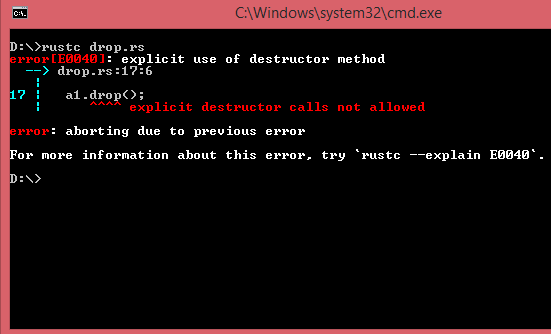📌 相关文章
- C#|特性(1)
- 锈 - 特性(1)
- 锈 - 特性
- C#|特性
- PHP 7.4 的新特性(1)
- PHP 7.4 的新特性
- Java 9 特性及示例
- Java 9 特性及示例(1)
- Scala-特性
- Scala特性(1)
- Scala特性
- 反应特性 - Javascript (1)
- angular 9 特性 - Javascript (1)
- angular 8 特性 - Javascript (1)
- Java 12 的新特性
- Java 12 的新特性(1)
- 反应特性 - Javascript 代码示例
- angular 8 特性 - Javascript 代码示例
- angular 9 特性 - Javascript 代码示例
- Python的高级特性
- Python的高级特性(1)
- 敏捷-特性
- 敏捷-特性(1)
- Groovy-特性
- Groovy-特性(1)
- 删除了 C++17 的特性
- 删除了 C++17 的特性(1)
- Oracle 服务器的特性
- Oracle 服务器的特性(1)
📜 锈落特性
📅 最后修改于: 2021-01-08 13:59:20 🧑 作者: Mango
掉落特性
- 当值超出范围时,丢弃特性用于释放文件或网络连接之类的资源。
- 丢弃特性用于在Box
指向的堆上释放空间。 - drop trait用于实现采用可变引用self的drop()方法。
让我们看一个简单的例子:
struct Example
{
a : i32,
}
impl Drop for Example
{
fn drop(&mut self)
{
println!("Dropping the instance of Example with data : {}", self.a);
}
}
fn main()
{
let a1 = Example{a : 10};
let b1 = Example{a: 20};
println!("Instances of Example type are created");
}
输出:
Instances of Example type are created
Dropping the instance of Example with data : 20
Dropping the instance of Example with data : 10
程序说明
- 我们已经在Example类型上实现了Drop trait,并在Drop trait实现的内部定义了drop()方法。
- 在main()函数内部,我们创建了Example类型的实例,而在main()函数的末尾,实例超出了范围。
- 当实例移出范围时,Rust隐式调用drop()方法以删除Example类型的实例。首先,它将删除b1实例,然后删除a1实例。
注意:我们不需要显式调用drop()方法。因此,可以说当实例超出作用域时,Rust隐式调用drop()方法。
用std :: mem :: drop提前删除一个值
有时,有必要在范围结束之前删除该值。如果我们想及早删除该值,则可以使用std :: mem :: drop函数删除该值。
让我们看一个简单的示例,手动删除该值:
struct Example
{
a : String,
}
impl Drop for Example
{
fn drop(&mut self)
{
println!("Dropping the instance of Example with data : {}", self.a);
}
}
fn main()
{
let a1 = Example{a : String::from("Hello")};
a1.drop();
let b1 = Example{a: String::from("World")};
println!("Instances of Example type are created");
}
输出:

在上面的示例中,我们手动调用drop()方法。 Rust编译器会引发错误,不允许我们显式调用drop()方法。代替显式调用drop()方法,我们调用std :: mem :: drop函数在该值超出范围之前将其删除。
- std :: mem :: drop函数的语法与Drop特性中定义的drop()函数不同。 std :: mem :: drop函数包含作为参数传递的值,该值在超出范围之前将被删除。
让我们看一个简单的例子:
struct Example
{
a : String,
}
impl Drop for Example
{
fn drop(&mut self)
{
println!("Dropping the instance of Example with data : {}", self.a);
}
}
fn main()
{
let a1 = Example{a : String::from("Hello")};
drop(a1);
let b1 = Example{a: String::from("World")};
println!("Instances of Example type are created");
}
输出:
Dropping the instance of Example with data : Hello
Instances of Example type are created
Dropping the instance of Example with data : World
在上面的示例中,通过将a1实例作为参数传递给drop(a1)函数来销毁a1实例。